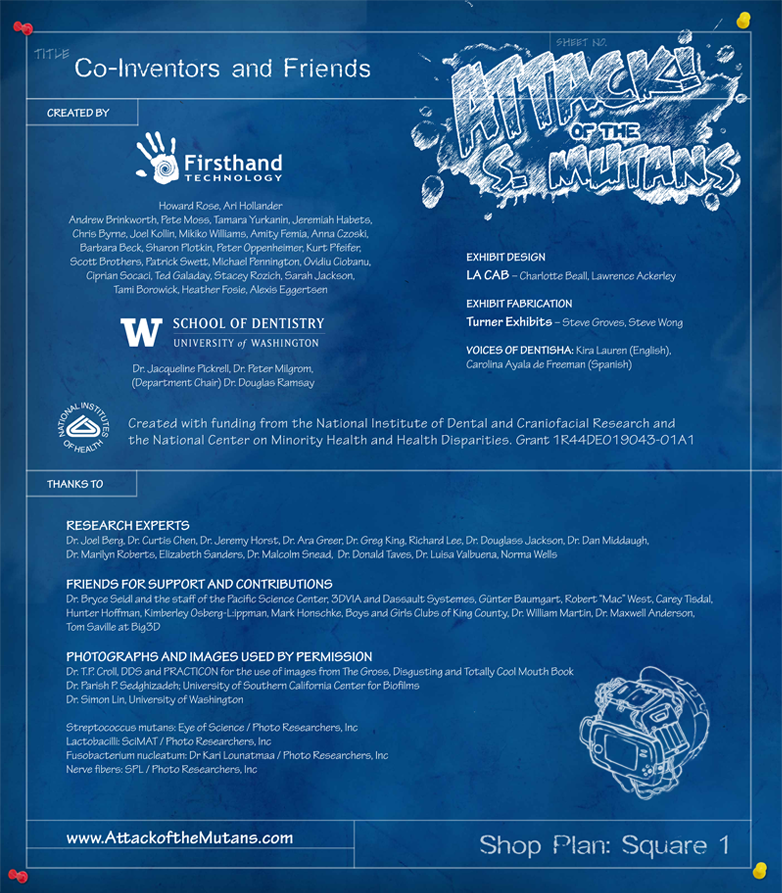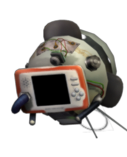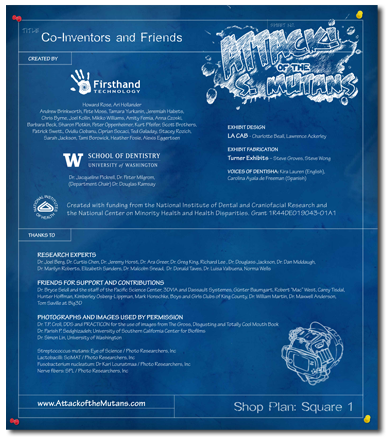Background
Weaving a Strong Oral Health Message
into a 3D Action Computer Game
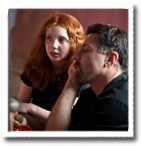 The vehicle of a high-quality 3D game enables kids to engage with science and an important health message through the medium of play. With the aim of helping the public take a fresh look at why self-care is important, the game and exhibit draw them into an adventure fighting bacteria and defending enamel. The big-screen stereo 3D adds to the fun of the experience; an asset in building memories that last. The goal is to have kids visualize wiping out our oozing plaque biofilms the next time they brush their teeth. On the larger scale, Firsthand Technology looks forward to applying the results of this research in oral health to advance other types of important health campaigns.
The vehicle of a high-quality 3D game enables kids to engage with science and an important health message through the medium of play. With the aim of helping the public take a fresh look at why self-care is important, the game and exhibit draw them into an adventure fighting bacteria and defending enamel. The big-screen stereo 3D adds to the fun of the experience; an asset in building memories that last. The goal is to have kids visualize wiping out our oozing plaque biofilms the next time they brush their teeth. On the larger scale, Firsthand Technology looks forward to applying the results of this research in oral health to advance other types of important health campaigns.
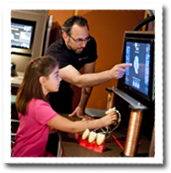 Funded by a grant from the National Institutes of Health, Attack of the S. mutans! was created with a distinct objective: determine whether a game can affect positive change in oral health behavior in children ages 8-12. While at the Pacific Science Center, Attack of the S. mutans! served as the basis for formal research - evaluating the effectiveness of games as behavior-changing vehicles for children. With 83% of young Americans having video game consoles at home, electronic gaming can serve as a powerful platform to spread a public health message - a model that has the potential to transform educational and public health programming.
Funded by a grant from the National Institutes of Health, Attack of the S. mutans! was created with a distinct objective: determine whether a game can affect positive change in oral health behavior in children ages 8-12. While at the Pacific Science Center, Attack of the S. mutans! served as the basis for formal research - evaluating the effectiveness of games as behavior-changing vehicles for children. With 83% of young Americans having video game consoles at home, electronic gaming can serve as a powerful platform to spread a public health message - a model that has the potential to transform educational and public health programming.
Presented in both English and Spanish, the exhibit and game have been designed to be effective in both the formal museum context as well as in mobile units that can easily reach underserved populations.
Attack of the S. mutans! was created by Firsthand Technology and the University of Washington School of Dentistry, with funding by the National Institute of Health.

Howard Rose

Ari Hollander

Firsthand Technology, Inc.
www.firsthand.com
Based in Seattle, Firsthand Technology Inc. designs and develops virtual reality, real-time 3D and serious games for therapy, research, education, and business. Founded in 1995 to take the best Virtual Reality (VR) technology practices out of the lab and into the real world, recent Firsthand projects include VR therapy for Iraq War veterans with PTSD, pain control systems for burn patients, and a training simulator.

Dr. Jacquie Pickrell

Dr. Peter Milgrom

UW School of Dentistry
www.dental.washington.edu
Dental Public Health Sciences (DPHS) is a research-oriented department in the University of Washington School of Dentistry dedicated to improving the oral health and general well-being of our diverse global population through research, teaching, and service. DPHS programs generate and disseminate new knowledge in preventive care for high-risk and underserved populations, while supporting community outreach clinics.
